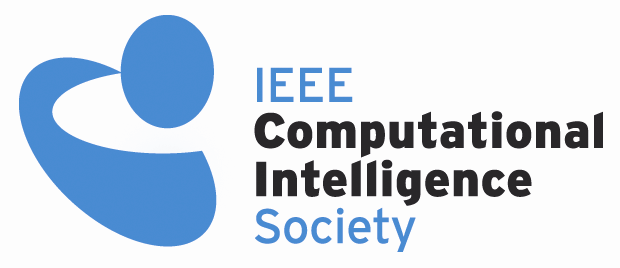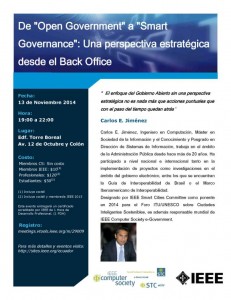2017 IEEE CIS Summer School on Computational Intelligence Theory and Applications
 |
 |
The IEEE Ecuador Section CIS Chapter, and the IEEE ETCM 2017, invite you to participate in the “IEEE CIS 2017 Summer School”, which will take place in Samborondón and Salinas, Ecuador, from the 17th to the 20th of October 2017.
The IEEE-CIS 2017 Summer School is offering the opportunity to discuss the state-of-the-art research and developments in Computational Intelligence (Neural Networks, Fuzzy Logic, and Evolutionary Computation), as well as to share the knowledge about Computational Intelligence by presenting algorithms, mathematical models and their application in different areas, such as pattern recognition, data mining, astronomy, biomedical science and engineering, signal processing, business intelligence, among others.
Venue and Dates
This School on Computational Intelligence will be the first of its kind in Ecuador, and it will be part of the Second IEEE Ecuador Technical Chapters Meeting – IEEE ETCM 2017. This summer school will be a 4-days event, jointly organized by the Ecuadorian Chapter of the IEEE Computational Intelligence Society (CIS), and the following universities from Ecuador: Escuela Superior Politécnica del Litorial – ESPOL, Universidad de Especialidades Espíritu Santo – UEES, and Escuela Politécnica Nacional – EPN.
During the first day (October 17,2017) of the summer school, we will have two tutorials, both of them will take place at the UEES labs. The last three days of the summer school (October 18-20, 2017) include plenary talks and a Doctoral Symposium; all these activities will take place at the Hotel Barceló at Salinas.
Plenary Talks
![]()
- Speaker 1: Daniel Alvarez-Torres
Affiliation: Chief Technology Officer IBM, Ecuador Topic: Watson
![]()
- Speaker 2: Fernando Buarque
Affiliation: Escola Politécnica de Pernambuco, Brazil Topic: Why Swarm Intelligence seems so appealing for complex problem solving
![]()
- Speaker 3: Pablo Estevez
Affiliation: Department of Electrical Engineering University of Chile Topic: Big Data, Astronomy, Computational Intelligence (To be confirmed)
![]()
- Speaker 4: Marco E. Benalcázar
Affiliation: Escuela Politécnica Nacional, Ecuador Topic: Machine Learning
Tutorials
![]()
- Tutor 1: Carmen Vaca
Affiliation: Escuela Superior Politécnica del Litoral – ESPOL University Topic: Web Data Analytics
![]()
- Tutor 2: Daniel Alvarez-Torres
Affiliation: Chief Technology Officer IBM, Ecuador Topic: Watson
Doctoral Symposium in Computational Intelligence
The Doctoral Symposium on Computational Intelligence is intended to bring together Ph.D. students within the computational intelligence field to discuss their research in an international forum. More precisely, the Doctoral Symposium will provide students with an opportunity to:
- Present their research work in a scientific environment
- Receive feedback and suggestions from peers and experienced faculty
- Gain an overview of the breadth and depth of the computational intelligence field
- Obtain insight into directions for computational intelligence research taken by other doctoral candidates
- Discuss concerns about research, the job market, and other issues
- Network with peers and future colleagues
Thus, this symposium will help to shape the ongoing and future research projects aimed at computational intelligence and will also promote scholarships and networking among new researchers in this emerging interdisciplinary area. This symposium will also expose these promising young researchers to the larger global community.
Advisory Board
The Doctoral Symposium advisory board will comment each presentation and at the end of the Symposium there will be a general discussion, including an analysis about the current and future research topics in the area.
![]()
- Advisor 1: Pablo Estevez
Affiliation: Department of Electrical Engineering University of Chile
![]()
- Advisor 2: Fernando Buarque
Affiliation: Escola Politécnica de Pernambuco, Brazil
![]()
- Advisor 3: Enrique Peláez
Affiliation: Escuela Superior Politécnica del Litoral – ESPOL University, Ecuador
![]()
- Advisor 4: Marco E. Benalcázar
Affiliation: Escuela Politécnica Nacional, Ecuador
Doctoral Symposium Requirements and Rules
- It is open only to Doctoral or Ph.D. Students.
- Each student with an accepted paper at the Doctoral Symposium must register and attend the ETCM: a special student fee applies.
- Each paper must be presented by the student.
- Submissions will be judged mainly on relevance, originality, technical quality and clarity.
- Paper length: up to 6 pages, following the conference-paper templates in Word or LaTeX provided by IEEE.
- Papers must be written in MS-Word or Latex including the following information:
- research problem.
- outline of objectives.
- state-of-the-art.
- methodology.
- expected outcome
- stage of the research.
Registered papers will be included in the proceedings of the conference and the papers presented at the venue will also be submitted to be included in the IEEE Xplore.
Important Dates for the Doctoral Symposium
| Full Paper Submission Deadline: | 7 July 2017 |
| Notification of Acceptance: | 31 July 2017 |
| Final Paper Submission: | 15 August 2017 |
| EarlyBird Registration: | 18 September 2017 |
| Workshops & Tutorials: | 17 October 2017 (Samborondón city) |
| Plenary talks and Doctoral Symposium: | 18-20 October 2017 (Salinas city) |
How to Apply to the Doctoral Symposium
Please submit your papers to the EasyChair platform using the following link, Doctoral Symposium track: https://easychair.org/c
IEEE Policy
IEEE reserves the right to exclude a paper from distribution after the conference (e.g., removal from IEEE Xplore®) if the paper is not presented at the conference. Papers are reviewed on the basis that they do not contain plagiarized material and have not been submitted to any other conference at the same time (double submission). These matters are taken very seriously and IEEE ETCM 2017 will take actions against any author who has engaged in either practice.
All papers will be cross-examined using anti-plagiarism automated software tools. PLEASE NOTE: To be published in the IEEEE TCM 2017 Conference Proceedings and IEEE Xplore®, an author of an accepted paper is required to register for the conference. Non-refundable registration fees must be paid prior to uploading the final IEEE formatted, publication-ready version of the paper. For authors with multiple accepted papers, one registration is valid for up to 2 papers. Accepted papers will be published in the IEEE ETCM 2017 Conference Proceedings. Accepted and presented papers will be published in the IEEE ETCM 2017 Conference Proceedings and submitted to IEEE Xplore®.
Accepted students must be ready to:
- Make an 8-minute presentation of the Ph.D. project (4 slides max) to be used for introducing a discussion about the project and its main issues during the small group sessions.
- Prepare a poster about the Ph.D. for the main conference poster session.
Best Ph.D. Project Award
A "Best PhD Project Award" will be conferred to the student of a paper presented at the Doctoral Symposium, selected by the Doctoral Symposium Chair, based on the combination of paper reviewing marks and the feedback of the Advisory Board. The award will be announced at the conference closing session. The author of an awarded paper will receive:
- A signed and stamped official award certificate.
- A plaque from IEEE Ecuador Section in recognition for the achievement.
- The announcement of their achievement on a special conference webpage.
Summer School Committee
![]()
- General Chair: Marco E. Benalcázar
![]()
- Honorary Chair: Pablo Estevez
![]()
- Plenary Talks Chair: Carmen Vaca
![]()
- Tutorials Chair: Dennis Romero
![]()
- Doctoral Symposium Chair: Enrique Peláez
![]()
- Doctoral Symposium Co-Chair: Diego Hernán Peluffo
![]()
- Publicity Chair: María Pérez
![]()
- Social Events Chair: Carlos Monsalve
Registration and Accommodation
Registration fee for IEEE Students: $ 245
Registration fee for Students: $ 285
Registration fee for IEEE Members: $ 400
Registration fee for Professionals: $ 500
Benefits that the registration fee will include
- Transportation from Guayaquil to Salinas, and from Salinas to Guayaquil
- Participant materials (bag, booklet, pen, etc.)
- Access to all lectures
- Access to all tutorials
- Access to other ETCM activities (in Salinas)
- Coffee breaks, banquet
- Social event
- A certificate for participation of the “IEEE CIS” Summer School
- A certificate for participation of the IEEE ETCM 2017
- Accommodation in Salinas (only for IEEE members (non-student grades) and Professionals fees – on triple occupancy – all-inclusive hotel that includes three meals per day)
Registration deadline: 15/09/2017
Payment methods: VISA, MasterCard, Diners Club, American Express, bank deposit. Details about recommended accommodation and room price: IEEE members (non-student grades) and Professionals registration fees include accommodation in Salinas (on triple occupancy, all-inclusive hotel).
The recommended accommodation in Salinas is in the same hotel where the event will be held. It is an all-inclusive hotel. Only students (including IEEE students) need to pay an extra fee for the hotel in Salinas. It has been considered on triple occupancy. Any participant can pay for a room upgrade (double or single room); fees are considered as an additional over the triple occupancy fee.
| Room type | Price (per day) |
|---|---|
| Guayaquil- Hotel Guayaquil – standard single room | 78 |
| Guayaquil – Hotel Guayaquil – standard double room | 82 |
| Salinas – Hotel Barceló – standard triple room (all-inclusive) | 65 |
| Salinas – Hotel Barceló – upgrade to double occupancy (all-inclusive) | +10 |
| Salinas – Hotel Barceló – upgrade to single occupancy (all-inclusive) | +75 |
Transportation Details
Salinas is a beach resort located 124 km from Guayaquil, and part of the Santa Elena peninsula. Address: Hotel Barceló -Salinas, Malecón de Salinas
Transportation: Salinas is accessible from Guayaquil via the “ruta del spondylus” road. There are public transportation companies that regularly travel to Salinas: LIBERPESA, CLP and COSTA AZUL. From Quito it is possible to get to Salinas by plane; TAME, the National Airline Company has a regular frequency to Salinas. More information can be found at: http://www.rutadelspondylu
Sponsors
 |
 |
 |
 |
More information and details can be found at: site.ieee.org/etcm-2017/d
Copyright © 2017 IEEE, All rights reserved.

